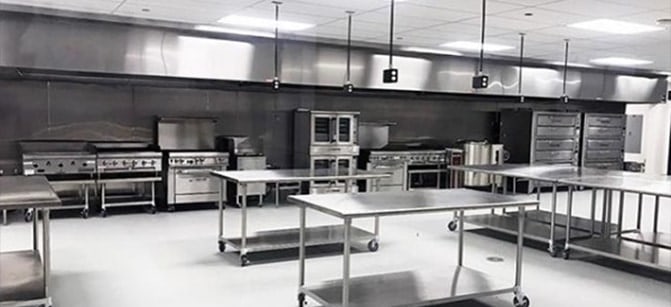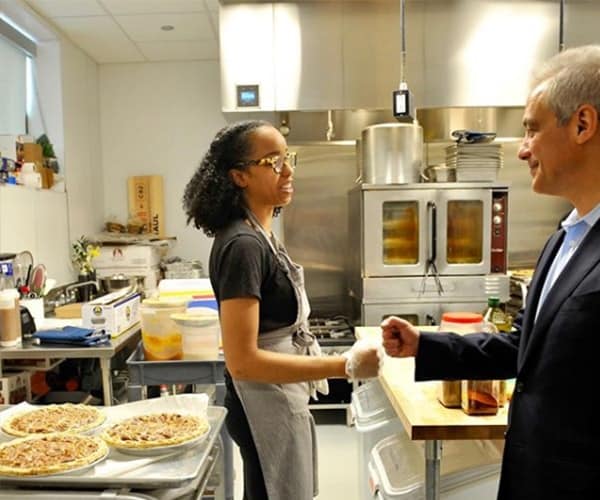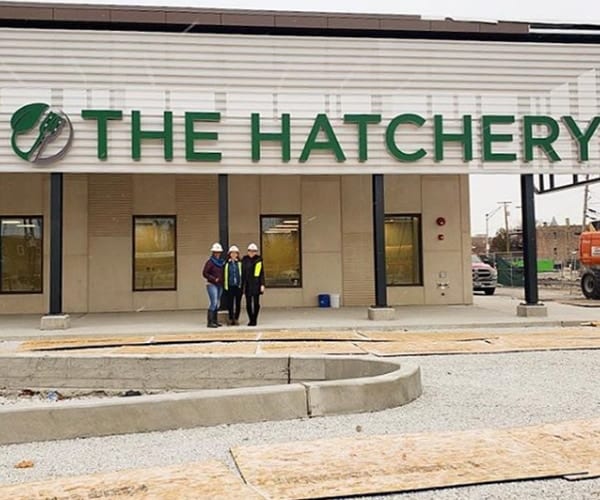Case Study: Firing Up An Incubator
The Story
When Anne Gadon Rodriguez, an equipment and design professional with Zepole Restaurant Supply in Bolingbrook, Ill., first heard about The Hatchery, it was the early days. “They were still fundraising,” she says. “It was just an idea.” A big idea, to be sure: a large-scale foodservice and product incubator, to be located in a somewhat downtrodden area of the Chicago’s near West Side, designed to help restaurateurs and consumer packaged goods purveyors scale up. The initial bid would include not only basic kitchen equipment for more than 50 small-space rental kitchens but also a sizable shared kitchen, and as Rodriguez notes, “it came in over a million dollars.”
“Ours is a very unique model—a combination of shared and private space as well as event and co-working space,” says Hatchery CEO Natalie Shmulik. “We also provide services—there’s a microlender onsite. So for the full facility, at 67,000 square feet, we are one of the largest food incubators.”
Incubators are not like everything else.
Zepole is a family-owned business that has been operating in the Chicago area for close to 40 years, and had seen a great variety of projects, but nothing quite like this. When Rodriguez brought it to his attention, company president Gary Thiakos found his imagination sparked. Soon, there were meetings between the two entities and Zepole became a “member” of the nonprofit.

“They were excited about our vision, and believed in it,” Shmulik says. “They saw there was a lot of potential and opportunity.”
Rodriguez notes that the early commitment was key to the successful relationship. “An organization like The Hatchery isn’t just, ‘Hey, here’s a big bid.’ They want to know we have skin in the game.”
In some early meetings, Zepole helped trim the project’s initial projected costs, saving somewhere between 10 and 15 percent, according to Rodriguez.
“We looked at them and said, ‘Put the money here, not there,’” Rodriguez notes. When the nonprofit finally made its decisions, the equipment bid went to three companies, with Zepole being the only local supplier. Later, Zepole became the facility’s chemical provider as well, providing cost-saving controlled dispensing units.
“When the project really came about, we were already supporting them, from a resource standpoint,” Thiakos says. “Being available to them and their tenants for any type of expertise. So there was a level of trust there, that we would be there for them and help them make smart decisions.”
Lots of cooks.
The Hatchery was a darling of the politicians in the neighborhood, as well as the former Chicago mayor. This factor, plus the influence of other stakeholders like the board, made for sensitive discussions all along the way. Probably the most challenging aspect of the project, Thiakos notes, was “overall coordination. It was just such a complex project with different phases and different parts of construction as a whole. Coordinating and making sure we met deadlines was critical.”

“You have to understand the intricacies, and know that everything we do has great impact,” adds Shmulik. “Everything we do has to keep our mission front and center.”
The big room.
The shared kitchen at The Hatchery takes up around 3,000 sq. ft., and space can be rented by the hour. Some of the clients there are developing packaged goods; others are trying to scale up, or use equipment they don’t have room for elsewhere. The equipment needs, in other words, were diverse.
“Certainly we were looking for very durable equipment, equipment that will last a long time,” says Shmulik. But we were also looking for equipment that will keep up with the pace of efficiency that the entrepreneurs will require.”
Zepole kept the end users in mind all along. “Being that there are diverse users going in there, you need to think about flexibility. The equipment going in needs to be able to service a baker as well as someone doing food production or pasta,” Thiakos says. “You have to be conscious that there are multiple users of the space. The cross functionality has to be there.”
In the end, the space was outfitted with ranges, deck ovens, convection ovens, mixers, prep sinks and a commercial grade dishwasher. Zepole generally doesn’t handle gas and plumbing, but their install team partnered with the union contractors to reach the opening deadline, at the start of 2019. A long hood along one wall sits over the hot line, and the middle of the space has two dozen 72-in. worktables. Clients enjoy a separate dish room as well as a dry storage area with cages.

“All of this gives them access to more powerful equipment, and a broader range of options to choose from.” says Rodriguez. “One client bought a dough sheeter from me, but she uses the fryers in the shared kitchen.”
…And then some.
Zepole has supplied equipment to more than a dozen of the tenants using one of the 54 small rental kitchens; the spaces come with a hood and a prep sink but generally require other machines. After just one year, the incubator is considered a success, and businesses born in the space represent the future of the foodservice industry in the city.
“As these businesses scale and grow, we feel like we were a part of that,” Thiakos says. “There’s nothing better than seeing that.”
Learn more about The Hatchery kitchen designed by The Kitchen Spot Expert Zepole Restaurant Supply.

